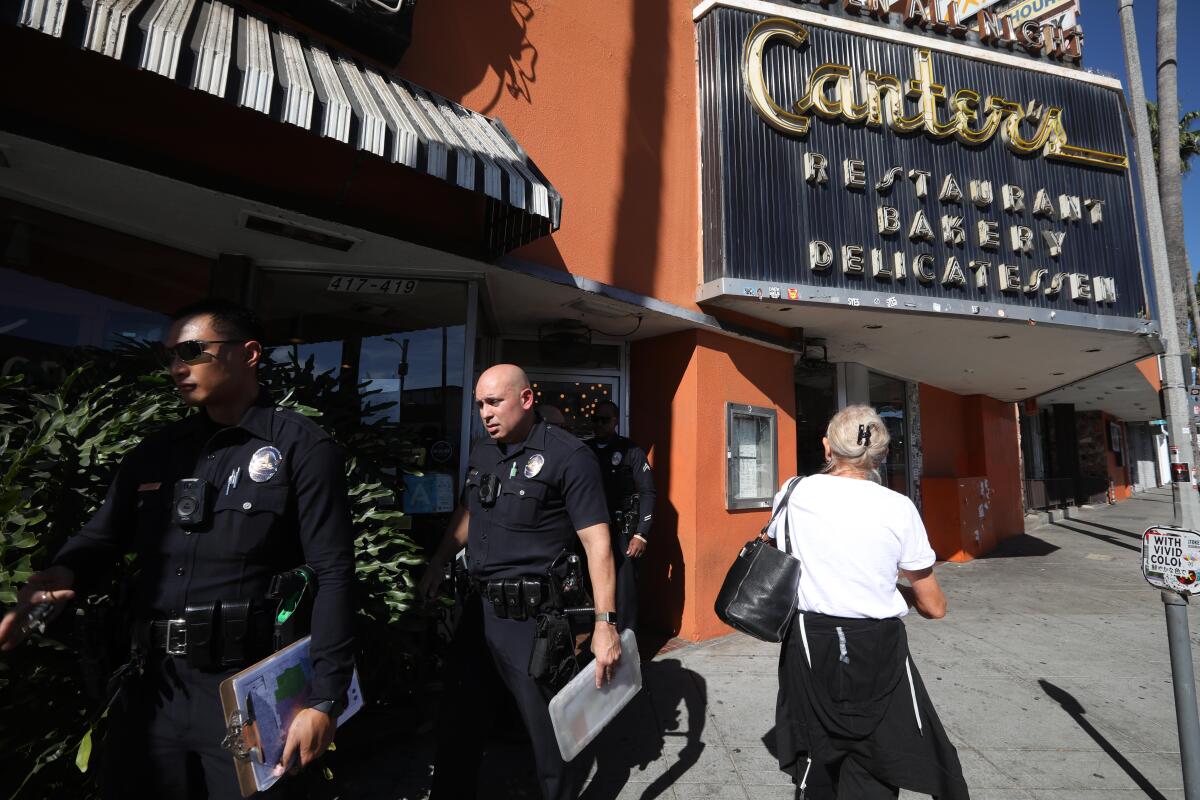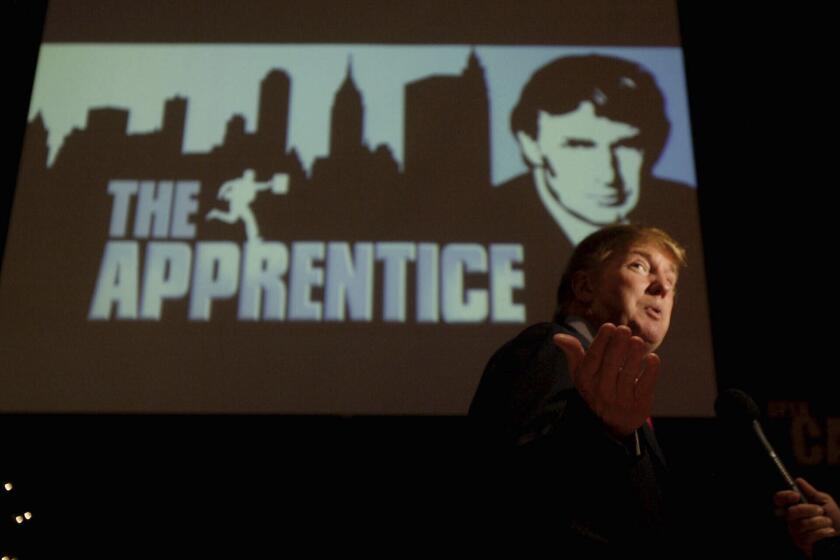Newsletter: Antisemitism and anti-Arab hate explode into view during the Israel-Hamas war

Good morning. I’m Paul Thornton, and it is Saturday, Nov. 4, 2023. Remember to savor that extra hour this weekend, courtesy of Sunday’s blessed return to standard time. Let’s look back at the week in Opinion.
UC Berkeley Law School Dean Erwin Chemerinsky, a familiar voice in The Times’ Opinion section, is not known for making histrionic arguments that rely more on emotion than fact or reason. So on the rare occasion he breaks character and shares his gut-level, deeply personal reaction to something, you know it’s a big deal.
And his op-ed article this week expressing shock at the level of antisemitism seen on college campuses since Hamas’ Oct. 7 attack on Israel — including his own university, where I went to school — is a big deal. Organizations have sounded the alarm for several years now about the negative experiences of Jewish college students; recall the 2015 incident of a UCLA undergraduate’s fitness to serve on a student government panel was questioned explicitly because she was Jewish. Nine years later, Chemerinsky’s op-ed article paints a picture of a problem that has festered for years and exploded into wider, much more dramatic view during the Israel-Hamas war.
But it isn’t only Jews facing increased mistreatment after Oct. 7. As noted by Abed A. Ayoub on our op-ed page, Arab Americans have listened to President Biden’s statements on the war with alarm, worried that the administration’s repetition of unverified, sensationalist claims would lead to violence directed at their community. Their fears, sadly, have been well-founded: On Oct. 14, a 6-year-old boy from a Palestinian and Muslim family was murdered in suburban Chicago, targeted because of his heritage and faith.
Ayoub says Biden’s rhetoric, coming from a president who the Arab and Palestinian community thought could set the right tone and push back against hate, has political consequences: “It has become clear, particularly over the past two decades, that neither political party can properly represent our large and growing community. We can no longer offer our vote and support in exchange for nothing. A poll released Tuesday shows support for Biden among Arab Americans was at 59% in 2020, but is now at 17%. We must be protected, and our concerns must be addressed.”
One would have hoped that in a country as geographically distant from the conflict zone as ours, Jews, Palestinians, Muslims and Arabs could feel a measure of safety. We need to do better, in times of war and peace.
Censuring the House’s only Palestinian American is a cynical ploy to silence opposition to Israel. Columnist Robin Abcarian calls out the Republicans targeting Rep. Rashida Tlaib (D-Mich.): “Our Republican-led House of Representatives, awash in chaos and dysfunction of its own making, has far better and more important things to do than to punish Tlaib for speaking her mind. Especially when she is motivated by long-held principle, and they are motivated by political theater.”
Palestinian Christians are losing loved ones in Israel’s bombing in Gaza. Sa’ed Atshan wonders why there isn’t an outcry from Western Christian communities: “Palestinian Christians, descendants of the oldest Christian communities, feel largely abandoned by the world — particularly by other Christian communities in Western countries — who seem indifferent or even hostile to the Palestinian struggle for freedom and human rights.”
She was a NOVID — until she wasn’t. Times editorial writer Carla Hall had been among the estimated 10% of Americans who’ve never had COVID-19, a distinction she held with pride. Last month, she writes, she was kicked off the exclusive island inhabited only by “NOVIDs” when she tested positive after coming back to Los Angeles from her high school reunion in Chicago.
Enjoying this newsletter? Consider subscribing to the Los Angeles Times
Your support helps us deliver the news that matters most. Become a subscriber.
Science could finally discover aliens. What does that mean? Astrophysicist Adam Frank isn’t talking about the UFO sightings popular in the public imagination (“Earth’s skies are simply not awash with alien phenomena,” he writes), but the exploding capability of “astrobiology” tools on and around our planet to peer into the atmospheres of distant worlds and detect the signatures of life. “The discovery of even a single other technological society would also offer an island of hope in the turbulent ocean of our history,” Frank says.
She’s 17, trans and loving life. Joy should be the norm for trans people. Alessandra Kahn, a high school senior in Los Angeles, shares the benefits of undergoing gender-affirming care as a teenager: “Today, I look in the mirror and am not filled with distress over the body I inhabit. Rather, I feel feminine, beautiful, empowered. In fact, I sometimes find myself unable to avert my eyes. That may sound vain, but never again will I let myself be ashamed for appreciating my trans body and trans mind.”
More from this week in opinion
From our columnists
- LZ Granderson: Colin Kaepernick’s exile from the NFL is dumber than ever
- Jonah Goldberg: Will the media get coverage of the crisis in Israel and Gaza right? It all depends on the editors
- Jean Guerrero: Día de Muertos used to scare me. Now I appreciate a holiday when the living commune with the dead
From the Op-Ed desk
- California didn’t ban Skittles. But it tackled a food safety problem the FDA hasn’t solved
- Crooked lawyers were crucial to Trump’s Jan. 6 plot. We clearly need to reform the profession
- In war and peace, the fates of Israel and the Palestinians are inextricably bound together
From the Editorial Board
- Huntington Beach will let neighbors censor neighbors’ reading choices. That’s wrong
- Pacific Coast Highway in Malibu is a deathtrap. Caltrans needs to radically rethink it
- Fake Halloween spiderwebs are truly scary — to wildlife
Letters to the Editor
- Hamas started this war. What did Israel’s critics think the response would be?
- The media’s obsession with pro-Trump cultism is killing mainstream Christianity
- This housing project isn’t “down the street.” It’s right next to single-family homes
Stay in touch.
If you’ve made it this far, you’re the kind of reader who’d benefit from subscribing to our other newsletters and to The Times.
As always, you can share your feedback by emailing me at [email protected].
A cure for the common opinion
Get thought-provoking perspectives with our weekly newsletter.
You may occasionally receive promotional content from the Los Angeles Times.




